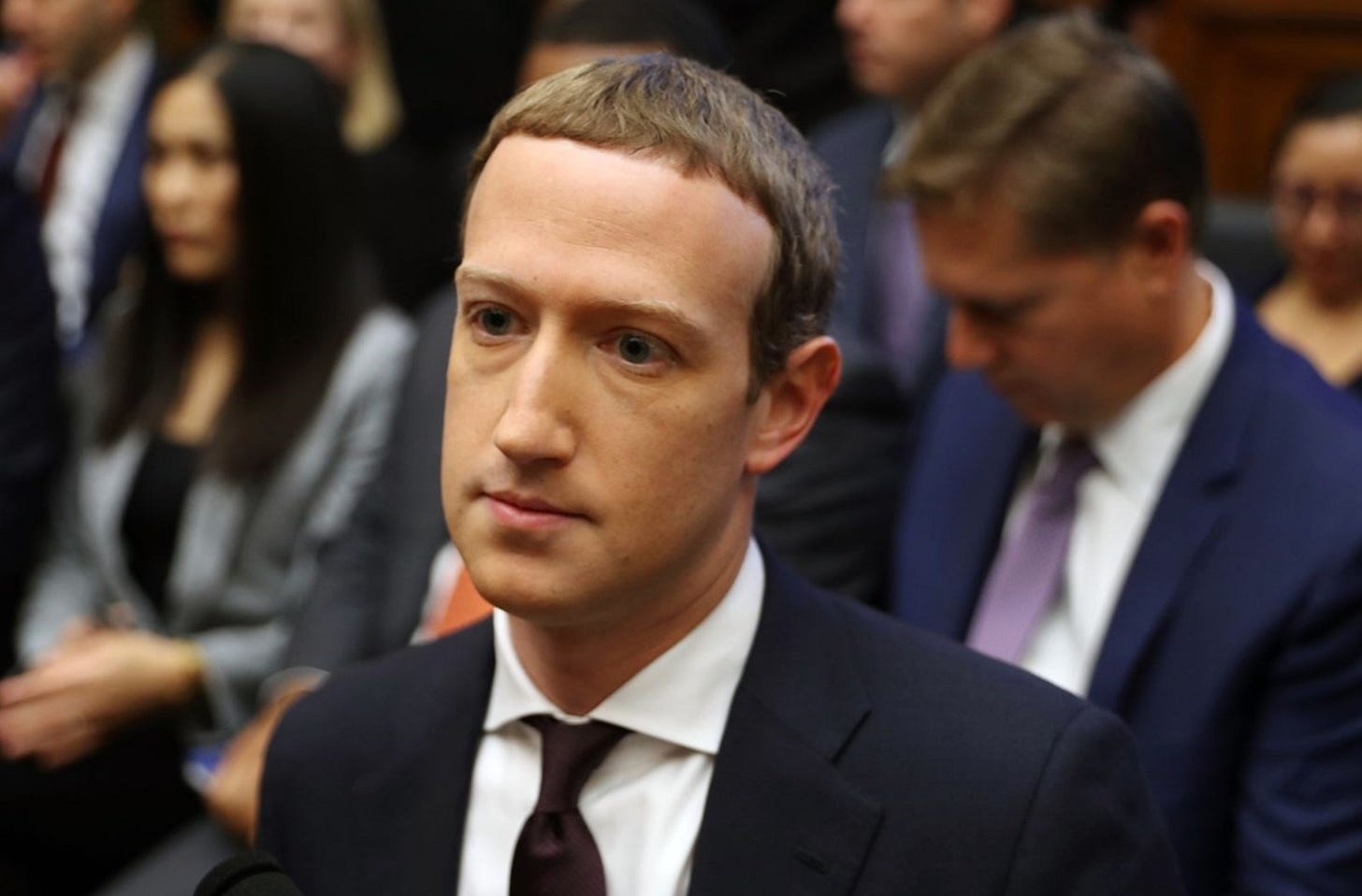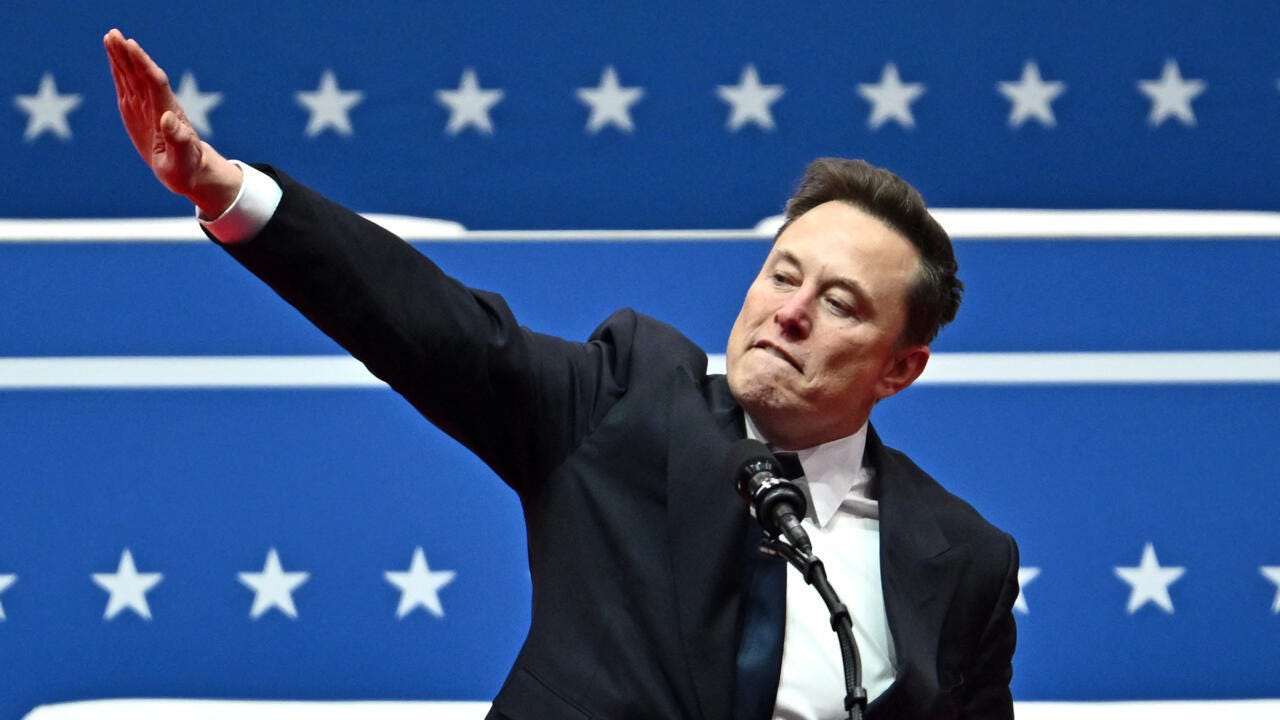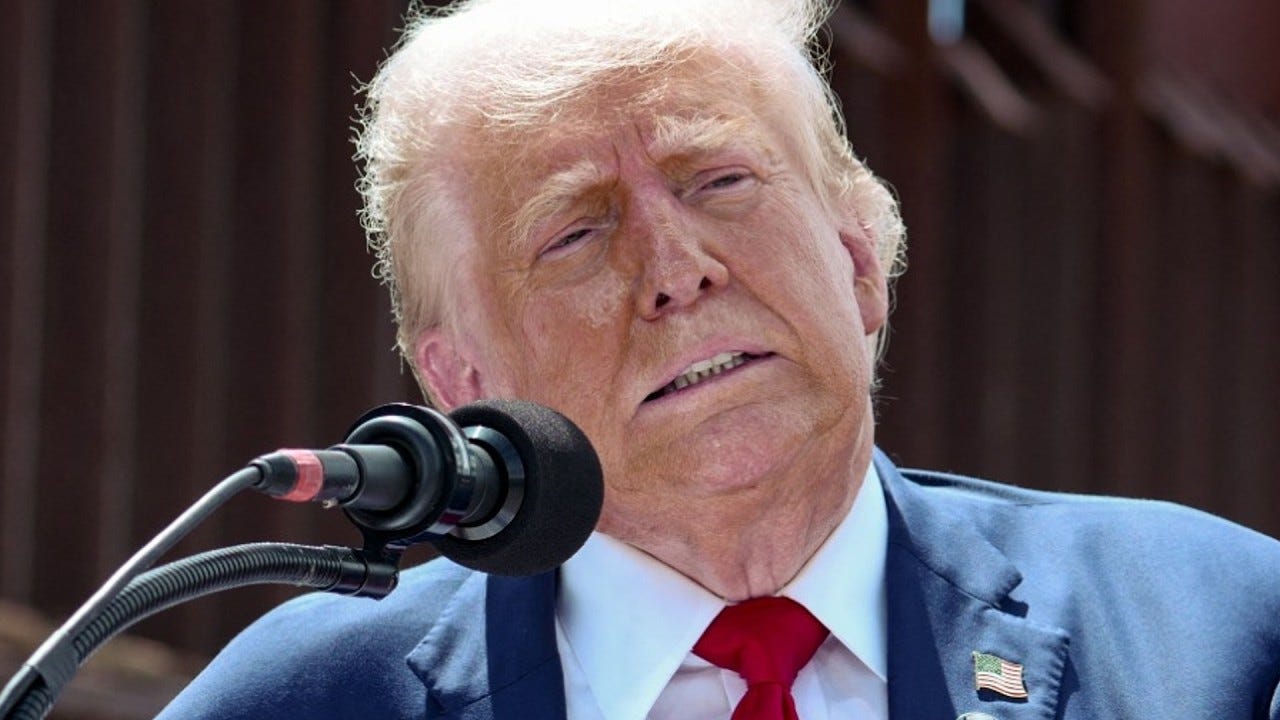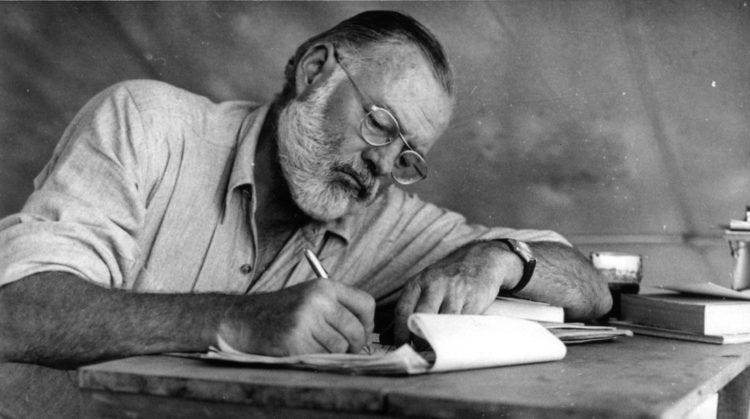On The Crisis of American Masculinity (in Washington)
What if this calamity comes...from exactly where you think it does?
Back before a band of ravening morons descended onto Washington D.C. to blot out the sky with their buffoonery a couple of weeks ago, you couldn't swing a dead cat on the internet without running into think-pieces about the "Crisis of Masculinity."
Maybe you've heard of this crisis? If you haven't, here's a thumbnail sketch.
Men in America are in trouble. Statistically, as well as observationally, this seems indubitably to be the case, and there are a number of points you frequently see bandied about to prove it. (I'm pulling the following from a 2023 discussion between Washington Post columnist Christine Emba and Vox's Sean Illing.)
Men are only earning just over 40% of bachelor's degrees in the U.S., while women are earning almost 60%.
Men constitute three quarters of people who die so-called "deaths of despair," which include things like suicide, drug overdoses, and alcohol-related deaths.
Men are increasingly anxious about the fact that the U.S. work force has increasingly moved towards "soft-skill" jobs (service industry, office work, etc.) and away from jobs that focus on manual labor, and they are expressing this anxiety in anti-social ways.
In a similar vein, the pollster John Della Volpe has been recently focusing on talking to men from Gen Z and to understand where they're at, and in particular why they moved so strongly towards Trump in the last election. In a recent piece, Volpe put it like this:
Ask any young man, and they’ll tell you: it’s hard to feel like a man when you’re struggling just to get by.
· You can’t plan for the future when you’re stuck in the present.
· You can’t feel strong when every bill makes you feel weak.
· You can’t build a relationship when you feel like you have nothing to offer.
This isn’t just about economics. It’s about what economic stress is doing to young men’s sense of purpose, their self-worth, and their confidence.
Now, if you're hoping that I'm going to tell you in some snarky way that this is not a problem, I'm sorry to disappoint you.
It very clearly is a problem.
It's just that I think we're not seeing it in quite the right way. The general idea is that young men don't know how to be men anymore. They don't know what it is to be "masculine," or they don't have ways to be "masculine" in the modern world.
Yeah, maybe.
But what if the crisis of masculinity does not start at the bottom, with Gen Z, but at the top, with people like this guy:
During the pandemic, Mark Zuckerberg (that epitome of suave charm whose mug features at the top of this meditation) showed up with a haircut modeled on that of Augustus, the man who founded the Roman Empire.
Was this an accident? Nope. It turns out that Zuckerberg and his wife went to Italy for their honeymoon, where he became so enamored with the emperor that, as he told the New Yorker, "My wife was making fun of me, saying she thought there were three people on the honeymoon: me, her, and Augustus. All the photos were different sculptures of Augustus."
In a not-dissimilar vein, Elon Musk, last seen giving Nazi salutes (as above) and rampaging through the servers of the federal government like a toddler taking out his rage at his own poopy diaper, is obsessed with Genghis Khan.
This is in large part because the famous Mongol sired so many children that traces of his DNA can purportedly be found in a significant percentage of the modern population. Musk apparently dreams of achieving the same feat, which seems to be one reason he has sired at least ten children, from numerous mothers, none of which he seems to actually spend much time with. (If you are a gamer, you probably know that Musk is also obsessed with not-so-convincingly pretending to be one of the world's best, offering as evidence things like the fact that as an upstanding family man, he spent 17 hours on Christmas Eve playing Diablo 4.)
And then there's Donald Trump, that He-Man among puny mortals, whose shortcomings (wink, wink) as a man have led him into a career of rape, fraud, racism, race-baiting, criminality, generally stupefying incompetence, and, thanks to the infinite wisdom of our fellow Americans, the seat in the Oval Office. Twice.
Mysteriously, many people seem to take Trump as an epitome of you-may-not-like-it-but-you-have-to-respect-it kind of bullying, swaggering masculinity, this despite the fact that his recent misadventures include (to pick one star out of that vast, glittering galaxy) recently announcing on social media that:
At my direction, we are going to make the Kennedy Center in Washington D.C., GREAT AGAIN. I have decided to immediately terminate multiple individuals from the Board of Trustees, including the Chairman, who do not share our Vision for a Golden Age in Arts and Culture. We will soon announce a new Board, with an amazing Chairman, DONALD J. TRUMP.
Before we get to the question of whether this is indeed "masculine," I would like to note that this pronouncement was so out of left field that even the Washington Post (which, like most media organizations still insists on sticking to a kind of forced, dispassionate formality, so that they're always using phrases like "the President asserted without basis" or even, if they're feeling plucky, "the President's assertion [qualifier] [qualifier] was untrue," leaving the casual reader to fill in the astonishing fact that the goddamn President of the United States of America is lying to the nation instead of making that the center of the story;– here's the thing, Washington Post, if Trump is a habitual liar and convicted felon who has repeatedly paid enormous sums after being adjudicated guilty of fraudulent behavior and has been found liable in civil court for sexual assault, why not say that? Is that not a part of the news? Is it not so embedded in every word this man says that it should be the context of everything that is presented to the reader about him? Writing a story about him without mentioning this is like writing a story about Al Capone testifying on the witness stand without mentioning his occupation! It's like if there's a rabid dog in the yard across the street and it just bit the last guy who walked by, and another guy approaches and asks if it's safe to walk past the dog, and you say, "It just likes to show its teeth," and conveniently forget to mention that the dog just likes to show its teeth right before it bites you, thereby giving you rabies!) even the Washington Post was dismasted enough by Trump's Kennedy Center "announcement" to huff that (oh, one other thing: You're owned by Jeff Bezos, you Washington Post morons, who prohibited you from publishing an endorsement before the election and has spent the time since cozying up to Trump in any and every way his fervid imagination can come up with! You think we're supposed to take you seriously!) anyway, what Donald Trump said was so ridiculous that even the Washington Post managed to huff in its subhead that:
The move by the president, whose authority to make the changes was not clear, is the latest attempt to bring a Washington institution under his control.
Oh, is that right? He declares himself the emperor of, and I'm quoting Wikipedia here, an institution "Authorized by the 1958 National Cultural Center Act of Congress, which requires that its programming be sustained through private funds," one in which members of the Board are appointed for six-year terms, not just willy-nilly, and in which the Chairman is elected by the board, and your response that the question of the basis on which Trump is doing this is "not clear"? Have you lost your minds? Is this a weird joke that no one else understands?
Finally, Washington Post, since I'm on a roll, did you actually read what Trump wrote?
This man wrote – and I'm quoting you quoting him, so I actually know you read it – that he has a "Vision for a Golden Age in Arts and Culture. We will soon announce a new Board, with an amazing Chairman, DONALD J. TRUMP." You're telling me it's not the least bit notable that this is the level at which the President of the Goddamn United States thinks and talks? You don't think this idiocy, and not the absurd content of whatever spills out of his face, is the real story? The man talks like a character out of The Simpsons! He feels the need to put his own name in all caps!
And you, Washington Post, you're sitting here muttering about how, well, we're not sure, but, um it's not clear whether he has the authority to do this, and we guess it's all pretty confusing and there's just so much going on that it's kind of hard to keep it all straight.
Anyway, my point is that these kind of men – Zuckerberg, Musk, Trump, Bezos, not to mention J.D. Vance, R.F.K. Jr., Kash Patel, Clarence Thomas, Samuel Alito, Brett Kavanaugh, Joe Rogan and the rest, a list so foul that if I were to try to enumerate their masculine issues, I would still be typing tomorrow morning – are the richest and most powerful men in our society.
This means they are the kind of men who have been the most rewarded by our society. In other words, the way they act has been given the highest endorsement – in the eyes of many, many people – that it is possible for our society to give.
This in turn means that they have become, somehow, dear God, the role models for what it means to be a "man" in America.
Be like them and you will be rich and famous and get to strut and order people around.
Be like them and you will make it to the top of the heap.
It boggles the mind. As you may remember from several paragraphs ago, these are men who get fascinated by a historical figure and adopt his haircut after ignoring their wife on their honeymoon so they can take pictures with busts of the guy.
These are men who have fantasies about impregnating as many hot chicks as they can so they can send lots of genetic copies of themselves into the world and are so insecure that they feel the need to lie about being good at video games.
These are men who earnestly believe that writing their name in all caps will make them bigger and tougher and cooler.
These are men whose shriveled up, desiccated little moral sense has long ago blown away in a dust storm; they are men operating at the intellectual level of college sophomores.
Given this, by any reasonable measure, doesn't it seem like these are the men we should be talking about when we talk about the "Crisis of Masculinity"?
Put more forcefully, I'm sorry, but if you can look at this collection of clowns and tell me that the "Crisis of Masculinity" is not in large part caused by them, then you're smoking drugs.
Here's another way into this idea: why is there no "Crisis of Femininity" in America? Women face enormous challenges, the glass ceiling still exists, and they take much of the brunt of the horrors of social media…but it's always the men who are in "crisis."
As Alia says in the only version of Dune that's worth watching, "And how can this be?"
One of the things you do if you spend a lot of time in the classroom and you're worth your salt is try to think about how different students learn, and about whether your teaching style is serving them all equally well. And if you only scratch the very surface of the thinking that has gone into this topic, you realize that boys and girls tend to respond better to different situations in the classroom, at least in part because of how they've been socialized.
To put one of the common observations here – which is backed by a good deal of research – into plain language, when they are young girls are praised for being good members of the community: playing nicely with others, taking care of their siblings, etc. Boys, on the other hand, are praised for being adventurous, outgoing, even a bit rascally. Basically, it's:
Look at her! She's so studious and responsible! She takes care of her little brother! What a good girl!
vs.
Look at him! He just put himself in a garbage can and rolled himself off the roof! What a cut-up! Kid's got some balls, though – he's gonna be a winner!
In the classroom, this means that teachers who stand at the front and operate through call and response questioning are tilting the classroom ever so slightly in favor of the boys (who have been more primed through their socialization to perform well in this kind of competitive, outgoing environment) and teachers who find more cooperative, social ways to teach (such as putting the students in small groups, sometimes segregated by gender) are tilting it in the other direction, ever so slightly in favor of the girls.
I'm not trying to argue in favor of some kind of gender essentialism, for there are certainly many exceptions and caveats here, but I find it a helpful example because I think it also allows us to see something larger about the "crises" in which American men seen to be recurringly stuck.
We create women who are flexible, who are taught that social cooperation is essential to success, and are thus able to (and in many cases, forced to) adapt to whatever situation comes along. But we create boys who think that a kind of bombastic, borderline mischievous independence is the key to success in life.
Incidentally, one thing this clearly might do is maladapt these boys for life in the modern world, which, I'm sorry to report, largely consists for many people of things like sitting in an office and cooperating with your office-mates, for which activity putting yourself in a garbage can (metaphorically or not) and rolling yourself off the roof is not good training.
But more directly, the main problem with the way we gender our boys is that it builds the crisis into the identity.
Because the flip side of dominance is the unavoidable anxiety bestowed upon all the men not at the top of the heap. If they're not The Man, then who are they?
And even the men who are at the top of the heap have been trained to think they're not quite big enough and strong enough and never will be, because there's always more to take and someone else threatening to take it.
So even they are never happy with what they have or who they are. Which is the definition of insecurity.
Ergo, any time you have a culture based on asking men to define themselves by a certain kind of rather aggressive, dominating mindset, you are going to have a crisis of masculinity. The "male insecurity" that is so much a feature of American culture – and so transparently drives the morons running our country – is a necessary component of the way we celebrate masculinity and of the kind of men our society rewards.
Now we get to the point in the essay where I deliver both the good news and the bad news, because in this case they are the same.
It's not that different models of American masculinity don't exist. It's just that we've worked so incredibly effectively to eradicate them.
American culture is replete with men who fulfill all the tenants of what the biological purists want to call "the way men just naturally are, with their high testosterone, adventurous spirits, and late-developing (if at all) maturity levels." It's just that the larger economic system around us, in conjunction with a now-decades-long mania for elevating STEM (Science, Technology, Engineering, Mathematics) not only in education but in culture itself, has rendered them invisible to the American consciousness.
In our sublimely stupid efforts to make golden idols of things like enormous wealth and life-denying "efficiency" we have assassinated the ideals like grace, wisdom, sacrifice and intellectual curiosity which were once available to men and women both.
If you want examples of this, all you have to do is dip a toe into American cultural history, where you will find an enormous variety of men, from Frederick Douglass to Paul Newman, from Walt Whitman to Albert Einstein to James Baldwin, from Chief Joseph to Caesar Chavez to Miles Davis, from Abraham Lincoln to Sandy Koufax to Oliver Sacks to John Carpenter, and on and on and on;– an astounding array of men who found their own impactful ways to be masculine in the world.
Were those men all perfect? Of course not. But the point isn't perfection.
The point is that the American model for successful masculinity in actuality stretches as far as a long jump by Jesse Owens, but it has become so radically constricted in the imagination of modern American men that just existing seems pointless, futile, unachievable.
Seen in this light, even our most contemporary notions of "manliness" are revealed to be thinner than the orange makeup around Trump's eyes. Take, for instance, one of the early 20th Century's avatars of heroic masculinity, Ernest Hemingway.
No angel, Papa. The possessor of a notoriously troubled personal life, Hemingway has been all but drummed out of the contemporary literary discourse because of his excessive masculinity. In his life and work, he lionized the kind of pursuits that would make even Don Jr. or Tucker Carlson feel all gooey inside: hunting, war reporting, drinking, boxing, boastfulness, and being an all-around surly son of a bitch anytime he felt like it.
And yet who are the men in the works of literature that Hemingway devoted his life to with a fanaticism that bordered on the mystical? In other words, what do we find when we actually think about the role models he put out into the world?
These are men, like Jake Barnes (The Sun Also Rises) and Frederic Henry (A Farewell to Arms) who are forced – along with the reader – not to celebrate their inevitable victory, but to struggle with the agonizing depth of experience that comes from their inevitable defeat.
They are men like Robert Jordan (For Whom The Bell Tolls) who realize that they are willing to sacrifice themselves alongside peasants and freedom fighters, in the face of a vastly superior force, for the cause of fighting against tyranny.
They are men like Nick Adams in the short story "Big Two-Hearted River" who use their contest with nature itself (fly-fishing, in this case) not to exert dominion but to try to recover some shred of themselves that has been decimated by the world.
And this is not even to mention David Bourne, protagonist of the posthumously released The Garden of Eden – a book on which Hemingway toiled for some fifteen years – who tries to come to grips with all of his own overripe masculinity, including the homoeroticism with which that masculinity is often inextricably entangled.
Am I saying that the young men of today would be better off if they read a lot of Hemingway and acted like Ernest? Not necessarily, although if it was Hemingway or Musk that had to serve as an example for contemporary manhood in America, I think we'd all take Ernest every day of the week and twice on Sunday.
What I'm saying is that the "Crisis of Masculinity" is not actually about there being a lack of ways to be a man today.
It's about the fact that the models men currently have – these clowns who happen to be running the world – are rotten to the core.
They offer nothing inspiring. The only example they set is one of domination.
And domination, friends, is not inspiring for anyone in possession of a soul.
So the next time you hear some guy complaining about how hard it is to be a man today, point them at a book or a movie or a piece of music from sometime before the last couple of decades, and say, "Here, study this."
They'll thank you for it.








I think there is something sad and strange and true in the distinction between bro and man. And between macho and masculine. I often think about how when I was surrounding myself with hair metal dopes and then discovered George Michael. I was like, Oh, shit, you can be this kind of a man?!?! More George Michael and Sonny Rollins and John Steinbeck and Jerry Garcia. Less Trump and Elon.
Your analysis of the different ways boys and girls are taught and conditioned was stunningly insightful and, to be honest, surprising to hear from a male. Thanks for paying attention. I do feel it necessary to point out that Zuckerturd made up for his honeymoon inattentiveness with this: https://sfstandard.com/2024/08/18/zuckerberg-sculpture-priscillachan-sf-arts/